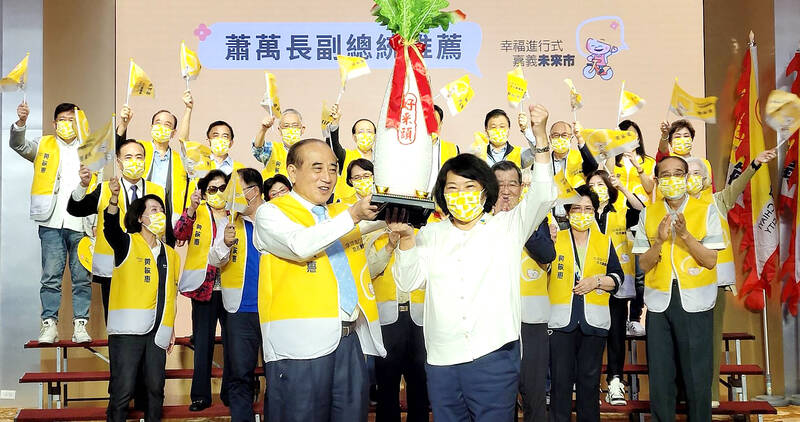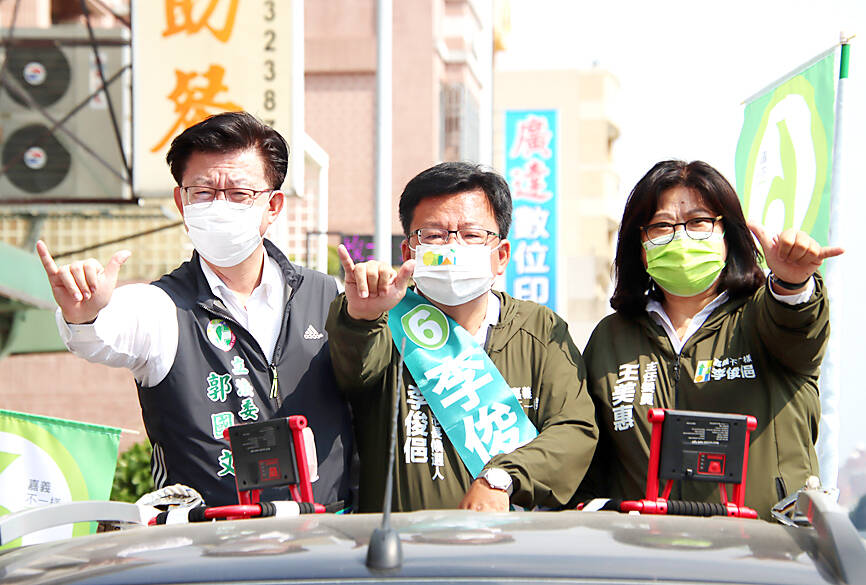The Chiayi mayoral election is to be held on Dec. 18, the Central Election Commission (CEC) said on Thursday, one day after the electoral process was stopped following the death of Huang Shao-tsung (黃紹聰), an independent candidate running in the election originally scheduled for Nov. 26.
The process was stopped based on Article 30 of the Civil Servants Election and Recall Act (公職人員選舉罷免法), dubbed the “anti-assassination clause,” which requires the commission to terminate the process if a candidate dies up to one day ahead of the scheduled vote.
The decision was made jointly with Chiayi City Election Committee representatives, CEC Director-General Huang Chun-ming (黃俊銘) said.

Photo: Ting Wei-chieh, Taipei Times
Registration for candidates would be open from tomorrow until Saturday, and their numbers on the ballot would be drawn on Nov. 29, Huang Chun-ming said.
Huang Shao-tsung was found unconscious on the floor in a bathroom in his home early on Wednesday. He was rushed to hospital, where he was pronounced dead, with the cause of death being heart attack.
CEC Deputy Chairman Chen Chao-chien (陳朝建) said the rescheduling would not affect the inauguration of the winner in the mayoral election on Dec. 25.

Photo: Lin Yi-chang, Taipei Times
Chiayi Mayor Huang Min-hui (黃敏惠) of the Chinese Nationalist Party (KMT), who is seeking re-election, and her Democratic Progressive Party (DPP) challenger, Lee Chun-yi (李俊俋), have said that delaying the vote would put a strain on electoral resources.
Calling the decision “regrettable,” Huang Min-hui said that holding the mayoral election in Chiayi on a different date than nationwide local elections would require about 3,500 additional election workers, which would be hard to find.
Asked whether she is worried about becoming the DPP’s sole focus after Nov. 26, Huang Min-hui said that many of her supporters were concerned, but she is ready to deal with the situation.
Lee said that he would campaign “until the end” — for DPP Chiayi city councilor candidates in the Nov. 26 election, and ahead of the mayoral vote next month.

South Korean K-pop girl group Blackpink are to make Kaohsiung the first stop on their Asia tour when they perform at Kaohsiung National Stadium on Oct. 18 and 19, the event organizer said yesterday. The upcoming performances will also make Blackpink the first girl group ever to perform twice at the stadium. It will be the group’s third visit to Taiwan to stage a concert. The last time Blackpink held a concert in the city was in March 2023. Their first concert in Taiwan was on March 3, 2019, at NTSU Arena (Linkou Arena). The group’s 2022-2023 “Born Pink” tour set a

CPBL players, cheerleaders and officials pose at a news conference in Taipei yesterday announcing the upcoming All-Star Game. This year’s CPBL All-Star Weekend is to be held at the Taipei Dome on July 19 and 20.

The Taiwan High Court yesterday upheld a lower court’s decision that ruled in favor of former president Tsai Ing-wen (蔡英文) regarding the legitimacy of her doctoral degree. The issue surrounding Tsai’s academic credentials was raised by former political talk show host Dennis Peng (彭文正) in a Facebook post in June 2019, when Tsai was seeking re-election. Peng has repeatedly accused Tsai of never completing her doctoral dissertation to get a doctoral degree in law from the London School of Economics and Political Science (LSE) in 1984. He subsequently filed a declaratory action charging that

The Hualien Branch of the High Court today sentenced the main suspect in the 2021 fatal derailment of the Taroko Express to 12 years and six months in jail in the second trial of the suspect for his role in Taiwan’s deadliest train crash. Lee Yi-hsiang (李義祥), the driver of a crane truck that fell onto the tracks and which the the Taiwan Railways Administration's (TRA) train crashed into in an accident that killed 49 people and injured 200, was sentenced to seven years and 10 months in the first trial by the Hualien District Court in 2022. Hoa Van Hao, a